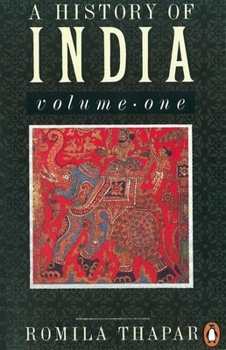Book Overview
A history of India upto 1300 AD introducing the beginnings of India's cultural dynamics
Format:Paperback
Language:English
ISBN:0140138358
ISBN13:9780140138351
Release Date:September 1990
Publisher:Penguin Books
Length:384 Pages
Weight:0.60 lbs.
Dimensions:1.0" x 5.2" x 7.8"
Age Range:18 years and up
Grade Range:Postsecondary and higher
Customer Reviews
5 ratings
Essential for early India
Published by Thriftbooks.com User , 19 years ago
Professor Thapar's book is required reading for those interested in a reliable and academically sound account of the history of early India. The book successfully gives the student an updated rendering of India's ancient past and prepares one well for further study. However, those expecting a detailed account of the Indus Valley Civilization might profitably look elsewhere, for though there is a good deal of attention paid to the "antecedents" of what might be called Vedic culture, the book really begins its history with the later and spans up until about 1300 CE. As far as any charge of a Marxist ideology is concerned I must admit that I don't see this as a very meaningful critique of her work. The book makes no attempt to illustrate the singular importance of class struggle in Indian history and any discussion of economic issues or trends hardly seems out of place. What the book does do is attempt to weave together a multi-layered reconstruction of India's ancient past given the available evidence. Any long looks the author takes at the "material" dimension of the subject (another critique suggesting Marxist leanings) is hardly unwarranted, but such looks do tend to make the book a bit harder to read and, for this and other reasons, the book does not fit the mold of a typical "Survey of Indic History" text; in many ways though, I guess that's the point. Whatever one might think of the book, one should keep in mind that no one scholar is better qualified to write a book on ancient Indian history and therefore the book's contents need to be taken seriously. The author is immensely learned and a veritable encyclopedia of knowledge on the subject. So, in sum, if you are interested in early India this book is very useful. You simply cannot call yourself well read on the subject until you read Thapar's work - and this one is just the beginning. Another book that I thoroughly enjoyed reading alongside this one and that filled in a good bit of detail here and there was Tripathi's HISTORY OF ANCIENT INDIA. The book, though in places outdated, is especially good at providing interesting details to such events as Alexander's campaign into the subcontinent - which, like many other parts of the book, genuinely reads more like a novel than a history text (or at least as a close to a novel as a history text can get).
An objective view of caste and economics
Published by Thriftbooks.com User , 21 years ago
Romila Thapar is one of the leading Indian historians. Her earliest book, which was very well received academically, was on the emperor Asoka. Her subsequent writings have elaborated the effects of economics on Indian history more than other historians have done, but while she may draw on Marx for some insights, she cannot be written off as a "Marxist." Paul Samuelson, Robert Solow, and Amartya Sen, all Nobel prize-winning economists, also use Marx to aid their interpretations of society when he makes sense.Ms Thapar also writes cogently about that a topic that is very sensitive for Indians, namely, caste, and the effects of that system on Indian society through the ages. Some of her comments or interpretations on this subject may not please everyone, but the effect of this system in keeping down, frequently in a brutal manner, persons considered to be of lower caste, has been quite pernicious in Indian history. It is no good taking an ostrich-like attitude towards this topic, or going into denial, which some of my fellow Indians are prone to do. This book could certainly be updated, but even as it stands it is a good introduction to Indian history.
The Best History Book on India
Published by Thriftbooks.com User , 24 years ago
Romila has done an excellent job. I have read many books on Indian history and none else even come close to it. The author treats all most all aspects of Indian history in the most professional way. Very easy to read, though her style of Enlish is slightly older one. The book deals with north India more thoroughly than south India. A must have for every personal library, especially for NRIs. It transformed my entire outlook of India & Indians and their relationship with other Asian nations.
Realistic,outstanding,superb!
Published by Thriftbooks.com User , 24 years ago
If you want a realistic understanding of India , go through this book. That's all I can say.Robert Heath PS: I'm presently doing research to earn my Phd and my topic is related to Indian history.
Great book of history about India.
Published by Thriftbooks.com User , 26 years ago
Romila Thapar's description of Indian history is captivating. It is very objective and impartial. It is a great book for any person with interest in the history of India -- the land of spiritualism.






